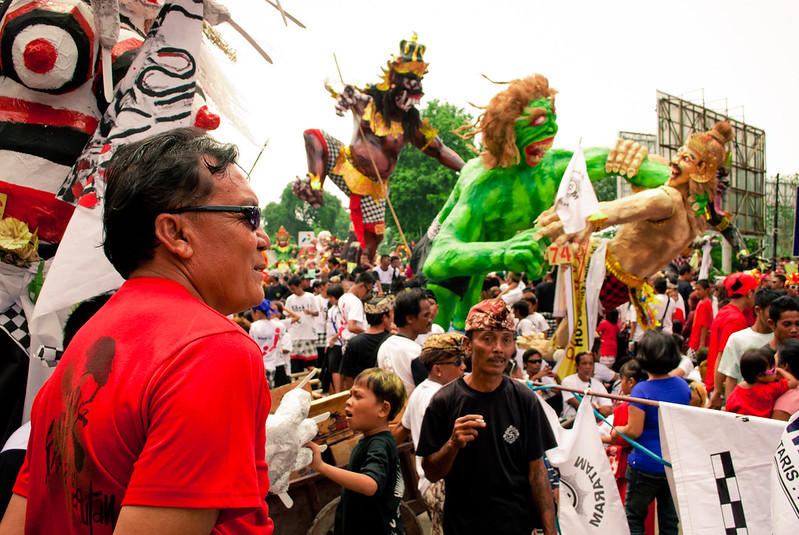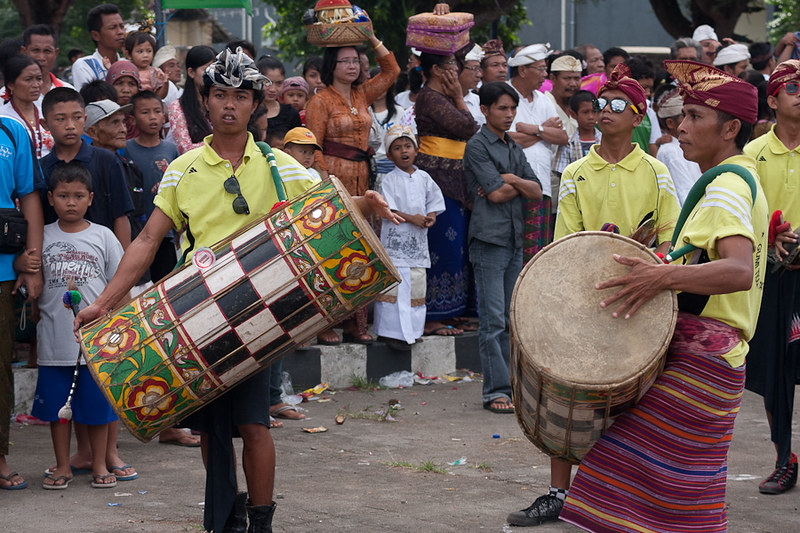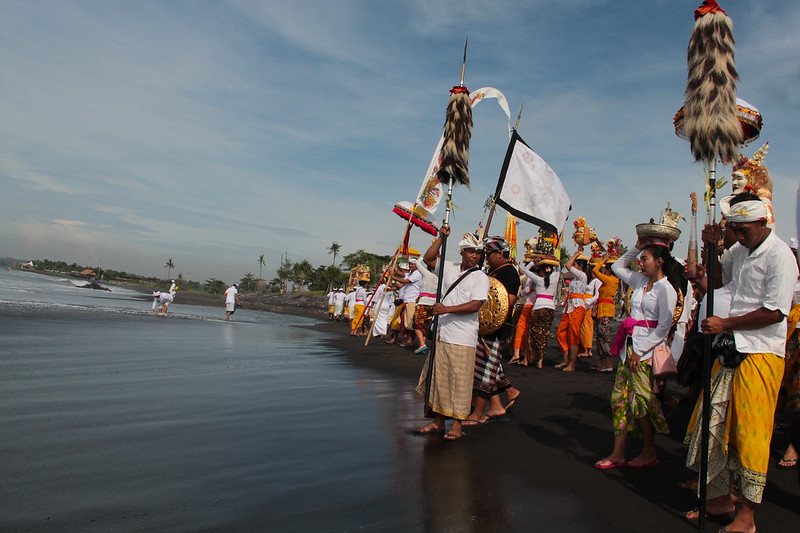Nyepi (Balinese New Year)
The World’s Most Mystical New Year—Bali’s Day of Silence
2026/03/18
Every spring, Bali transforms for Nyepi (Balinese Hindu New Year), a day of silence and prayer unlike anywhere else on earth. There are no fireworks or parties; instead, for 24 hours, the entire island falls completely silent—no lights, no traffic, no work, and no entertainment. It is a sacred ritual where nature, the cosmos, and the human spirit become one.
On Nyepi morning, only birdsong and the wind break the silence, the night sky is ablaze with stars, and the air feels astonishingly pure. The cool stone underfoot, the lingering scent of incense from rituals, the taste of simple home-cooked food, and the hush of empty streets… On this day, all five senses are sharpened, and the beauty of stillness is rediscovered.
Main Attractions
Ogoh-Ogoh Parade and Bhuta Yajna Ritual
On the eve of Nyepi, the island erupts in excitement for the Ogoh-Ogoh Parade. Giant demon figures (Ogoh-Ogoh), made of bamboo and paper, are paraded through the streets to the sound of gamelan and cheering crowds. Afterward, the Bhuta Yajna ritual sees the effigies burned, purifying the island of evil spirits and preparing for the new year.
Melasti Ceremony
Several days before Nyepi, people in white ceremonial dress gather at the sea or lakes for the Melasti ritual, cleansing sacred objects in holy water. The sound of prayers, the spray of waves, and the lines of worshippers create a powerful sense of renewal for body and land alike.
Nyepi Day: The Day of Silence
On Nyepi itself, the entire island observes the Catur Brata Penyepian (Four Prohibitions): no fire or lights (Amati Geni), no work (Amati Karya), no travel (Amati Lelungan), and no entertainment (Amati Lelanguan). The airport closes, internet is shut down in many places, and everyone—locals and tourists alike—spends the day in meditation, prayer, or quiet reflection. At night, a star-filled sky appears, free from any light pollution.
Omed-Omedan (Kissing Festival) and Ngembak Agni
The day after Nyepi is a time of joy and reconnection. In Denpasar’s Banjar Kaja Sesetan, young people gather for Omed-Omedan, a playful “kissing festival” with water splashing and laughter. Across the island, Ngembak Agni is celebrated as families and friends forgive one another and greet the new year with smiles and togetherness.
Cultural and Historical Background
Nyepi’s origins trace back to the Saka calendar, brought from India around the 1st century CE. This calendar, along with Hinduism, reached Java and, after the fall of the Majapahit Kingdom in the 15th century, was carried to Bali by scholars and priests. Balinese Hinduism is a unique blend of Indian Hinduism, Buddhism, local animism, and ancestor worship, with Nyepi as its most emblematic festival.
The prototype for the “Day of Silence” lies in ancient Balinese rituals called Kajeng Kliwon, where villagers would close their homes, extinguish fires, and feign silence to deceive evil spirits and ward off misfortune. This merged with Hindu concepts of New Year’s purification, and by the 16th century, Nyepi had taken its current form. The Ogoh-Ogoh parade, now a highlight, evolved in the late 19th century to include artistic competition and community creativity.
During Dutch colonial times and the waves of modernization, Balinese communities (banjar) preserved Nyepi as a pillar of tradition. Even as tourism grew, local leaders—known as penjaga jagat kala, or guardians of tradition—have maintained strict observance. For example, the complete closure of the airport on Nyepi was formalized in 2005, demonstrating Bali’s commitment to silence despite outside pressures.
The concept of “hiding the island from evil spirits” is rooted in Balinese reverence for nature. Surrounded by volcanoes and the sea, rituals evolved as a way to protect the island from disaster and disease. Even today, the Melasti ritual involves carrying holy water from temples, with village priests (api manyuk, “keepers of the fire”) leading prayers for cosmic balance.
Participant Voices
Nyepi is the most profound experience of my life. The silence feels like a dream, and the beauty of the stars at night is overwhelming. It’s a day when I truly feel connected to the universe.
Fun Facts
- Nyepi is the only day of the year when Bali’s airport is completely closed.
- Tourists must also observe the silence and remain within their hotel or villa grounds.
Festival Dates
Nyepi is held every spring throughout Bali. Witness the excitement of the Ogoh-Ogoh Parade, the profound silence of Nyepi Day, and the joy of renewal—an experience best felt in person.
The event schedule is subject to change. Please check the official website for the most up-to-date information.
Information
| Name | Nyepi (Balinese New Year) |
| Country | Indonesia |
| Area | Bali |
| Date | 2026/03/18 |
| Link |
Upcoming Festivals
Kukeri(Surva) Bulgaria
Bulgaria’s Festival of Spirits, Fire, and Bells That Drives Away Winter
2026/01/22Dinagyang Philippines
Iloilo’s Thunderous Festival of Faith, Tradition, and Dance
2026/01/22The Northern Lights Festival (Nordlysfestivalen) Norway
A Tromsø Miracle: Music and Aurora Dancing in the Arctic Night
2026/01/25Carnavales de Ituren y Zubieta Spain
Ancient Echoes and the Festival that Awakens Spring in the Basque Mountains
2026/01/26Up Helly Aa United Kingdom
A Night When Fire and Viking Pride Blaze in Shetland
2026/01/29Winterlude Canada
A Wonderland of Ice, Light, and Smiles in Canada’s Capital Region
2026/01/30Carnival of Viareggio (Carnevale de Viareggio) Italy
A Spectacular Parade of Giant Papier-Mâché Masterpieces
2026/01/30Fiesta de la Candelaria(Virgin of Candelaria) Peru
A Grand Dance Festival of Faith and Folklore Echoing on the Shores of Lake Titicaca
2026/01/31Thaipusam Malaysia
A Pilgrimage of Prayer and Penance Illuminates Batu Caves
2026/01/31Jaisalmer Desert Festival India
When Rajasthan’s Golden Dunes Dazzle with Color and Culture


